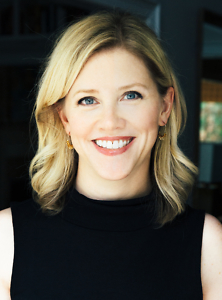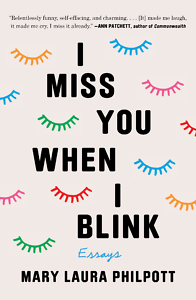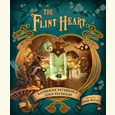Try it Again, More Like You
In I Miss You When I Blink, Mary Laura Philpott delivers an irresistibly charming memoir in essays
The title I Miss You When I Blink came to Mary Laura Philpott in a moment of serendipity, from the mouth of her then-six-year-old son. Over time, this “perfect sentence” became the defining aphorism of Philpott’s life: “I miss you when I blink,” she writes. “I have felt it so many times in my life, at points where I didn’t really know who I was anymore, where I felt that when I closed my eyes, I could feel myself gone.”

The theme of losing an identity and then finding it again is what unifies this diverse essay collection. Though the book is technically a debut, Mary Laura Philpott’s name is probably familiar to readers, thanks to her irreverent book of cartoons, Penguins with People Problems, her widely read essays in The Washington Post and The New York Times, and, of course, as co-host of Nashville Public Television’s Emmy-winning author-interview program, A Word on Words.
I Miss You When I Blink will resonate especially with women, like Philpott, who came of age in the immediate aftermath of Second-Wave Feminism—the first generation of women raised to believe they could—and should—“have it all.” Philpott checks all the boxes: a degree from a highly selective college, career success, a happy marriage to a total mensch, motherhood. And yet, as Philpott writes, “You can find yourself at a time when, no matter how many things you’ve done right—really, truly right in the moment when you did them—you feel like something is wrong. No, everything is wrong.”
The dread Philpott describes is unyielding, perhaps more so because she knows she has nothing to complain about: “It wouldn’t be fair for me to say ‘I’m just an average person,’ or ‘an ordinary’ person, because I am also a lucky person,” she writes. “But being fortunate doesn’t mean you won’t reach a certain point in life—many points, actually—and panic.”
 I Miss You When I Blink will clearly appeal to the audience for books like Wild and Eat, Pray, Love: memoirs by gifted women who respond to extreme identity crises first by blowing up their lives and then by undertaking dramatic projects of reinvention. In some respects, I Miss You When I Blink explores the same emotional territory as Wild and Eat, Pray, Love, but Philpott’s book is an essay collection, not a traditional linear memoir. And Philpott’s identity crisis is of a variation in which the protagonist resists the urge to self-destruct. Instead, through a combination of luck and pluck, she finds a way to start over without losing everything worth keeping in the process.
I Miss You When I Blink will clearly appeal to the audience for books like Wild and Eat, Pray, Love: memoirs by gifted women who respond to extreme identity crises first by blowing up their lives and then by undertaking dramatic projects of reinvention. In some respects, I Miss You When I Blink explores the same emotional territory as Wild and Eat, Pray, Love, but Philpott’s book is an essay collection, not a traditional linear memoir. And Philpott’s identity crisis is of a variation in which the protagonist resists the urge to self-destruct. Instead, through a combination of luck and pluck, she finds a way to start over without losing everything worth keeping in the process.
I Miss You When I Blink also happens to be very, very funny. On dog ownership: “Everyone knows you have to have dogs before you have babies, because being great at owning a dog is how you show the world you’re ready for children. Obviously.” On courting her future husband while suffering through PMS: “Nothing fans those sexy flames like period talk.” At the nadir of her depression, Philpott considers moving into a separate residence but staying married, a la Diane Von Furstenberg. Predictably, the idea fizzles: “I shouldn’t be surprised Diane Von Furstenberg’s living arrangement didn’t fit me. Her wrap dresses never have either.”
By injecting dire moments with self-effacing irony and slapstick humor, Philpott simultaneously provides levity and illuminates the tragi-comic nature of modern American life, wherein even the most fortunate of us struggle with a search for meaning. I Miss You When I Blink is a generous collection, written as if to say “I see you; you are not alone” to the many readers who lead outwardly happy lives yet privately wonder why they don’t feel as happy or fulfilled as the world tells them they should.
Though the target audience for I Miss You When I Blink is Gen-X women, the book’s appeal crosses generations and genders thanks to Philpott’s gift for finding the absurdity in despair (and everything else under the sun, for that matter), her honesty, and the universality of her experiences on the road to discovering that “joy is bigger than fear.”

Ed Tarkington’s debut novel, Only Love Can Break Your Heart, was published by Algonquin Books in January 2016. He lives in Nashville.


